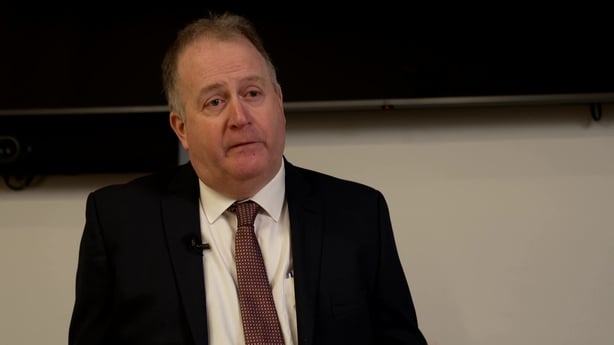Figures compiled by gardaí show €378 million was reported stolen through online fraud in the five years to the end of 2024.
However, the actual amount stolen is known to be much larger, as many victims of online scams do not report their loss.
"Phishing text messages, business email compromise, investment fraud is still very prevalent," Detective Superintendent Michael Cryan of the Garda National Economic Crime Bureau told Prime Time.
"Reports of romance fraud rose in 2024, and you've the seasonal ones, and there is accommodation fraud, loan fraud, shopping online fraud is always there as well," he said.
"In late 2024 we saw slight variations on some scams... rather than having links inserted in the text, there were phone numbers and people were being asked to ring the phone number," he added.
In the past, fraud was considered a sub-section of crime mainly involving face-to-face interaction. However, the proliferation globally of high speed and mobile internet access has allowed tens of millions of potential victims to be targeted by scam emails and texts.
"Deception is very simple," said Det Supt Cryan, "it is 'I tell you a lie, you give me money.' It's a very simple concept. With the internet, you have almost the industrial revolution of fraud, and it's international, it's transnational, so they can target victims in many different countries."

Some 444 people reported to gardaí that they had been scammed through investment fraud last year.
One of those victims - ‘Thomas’ - a businessman, spoke to Prime Time. He lost €17,000 in a cryptocurrency investment scam, after being deceived twice by two different scammers.
After seeing an offer on social media last August, he opened a cryptocurrency account on an online site, starting by depositing €50, then adding more money slowly. The account showed that his profit was rising, so he put in €500.
He was soon getting calls from the person operating the platform he was investing with, urging him to put in more to maximise profits. He put in €2,000 and then €3,000.
"I had video calls with a guy and he showed me a passport for identification," said Thomas.
"He told me he was from Kazakhstan. At one point I wanted to withdraw some money and I was able to withdraw €600. It seemed all ok."
But Thomas was being slowly reeled in. After he withdrew that €600, he invested a larger sum. Eventually when he tried to cash out and get back his €12,000, all went quiet, he couldn't reach the person now in control of his money.
When the person did then make contact, he said Thomas needed to invest even more money to get back his investment. At that point, Thomas knew he had been scammed.
However, rather than go to gardaí, Thomas searched online to try to find a way to regain control of his investment. That is when he was scammed a second time - when a seemingly legitimate person in the United States said he had found the money and could return it. Again, Thomas was asked to pay a fee to free up the funds.
Thomas believed this person was legitimate as they had online testimonials to say they had recovered funds for others, he now knows those references were part of the scam too.
Last November, Thomas went to gardaí.
He had kept the passport details of the person who stole his original cryptocurrency investment, but he now knows that is likely to have been a false document.
Thomas said he was telling his story because he wants the public to be aware the risks.
"I feel bad that this happened. One scam, and then a second scam. These people are working so hard to get your money. They know what they are doing, they know how to use people's minds. They are very good at that," he said.

Det Supt Cryan agrees that the scammers targeting people right across the world are tapping into human emotions, human needs, human frailties.
"It's exploitation. ‘Social engineering’ is a term they use, but it is financial exploitation," he said.
"The victims can be people looking to make money, get a return on an investment. You can have people looking for companionship and targeted by romance fraud - they're emotionally preyed upon by criminals. You can have people who are cash-strapped and looking for loans, they need money at Christmas or for school and they go online looking."
"The criminals will see where the need is in society and they will try and manipulate that in their favour."
It's not just the Garda National Economic Crime Bureau that is dealing with scammers. Gardaí right across the country are receiving reports of fraud and attempted fraud. Sixty officers from stations around the country recently completed a fraud course, the intention is they will bring their expertise back to a local level.
International outreach is also proving critical when chasing stolen cash. Money can be whisked out of an Irish account and funneled through accounts in other countries before being 'cashed out' by money mules, who are individuals allowing their accounts to be used by others for criminal purposes.
Det Supt Cryan stresses that gardaí are working closely with police forces in all continents on a daily basis tracking money stolen from Ireland and money stolen from abroad which makes its way into Irish accounts.
"This is not normally just one person sitting behind a computer somewhere. This is organised crime. There is a network of people, there is recruitment of money mules, there is a money laundering, there are people creating false documents and websites... It is very international," he said.
Among the overseas agencies that are working with the gardaí is the FBI in the United States. It has agents and intelligence analysts stationed at embassies around the world to liaise with local law enforcement.
The Unit Chief of the Agency's Cyber Enabled Fraud and Money Laundering Unit - Ronan Byrne - told Prime Time that the FBI has seen significant growth in online fraud in recent times.
"The type of fraud that we are seeing is on an industrial scale. The FBI's Internet Crime Complaints Centre, which collects data, shows that in 2023 there were reported losses of $12.5billion, and that is up 22% on the previous year," he said.
"You can have 'lone wolves' or small groups of criminals, but the major fraud targeting US citizens and others is organised criminal syndicates from around the world. In southeast Asia we see crypto investment fraud groups. In India, we see tech fraud and government imposter schemes, and out of west Africa we see business email compromise and romance schemes."

Previous international police investigations have revealed how many people have been trafficked and forced to work in so-called 'scam factories', where they spend long days sending emails and texts and making calls - very often to countries like Ireland - all designed to trick people into parting with their cash.
Such scam factories are thought to be particularly prevalent in southeast Asia, yet there are many scammers within our borders also, and money mules.
Gardaí are asking the public to be aware of the risks of online fraud. They say if you do fall victim to a scam you should report it as soon as possible.
That way, they say, you stand the best chance of getting your cash back, and give investigators the best chance to catch those criminals operating in this ever- growing area of criminality.
A report from Barry Cummins and Aaron Heffernan into online scams and fraud is broadcast on the 14 January edition of Prime Time at 9.35pm on RTÉ One television.





